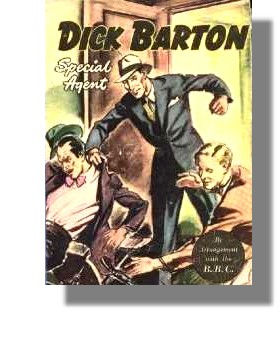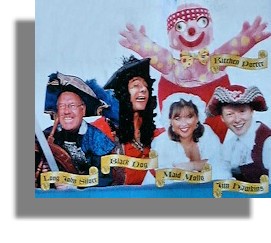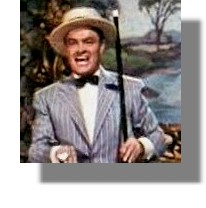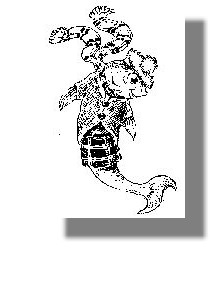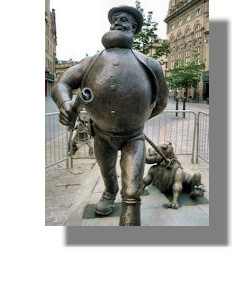Scottish Memory Lane - Entertainment
Going to the cinema was a favourite past-time and listening to radio shows - and a great treat was going to a pantomime at Christmas. Before the days of TV there was a lot more reading - including "comics" as well as books.I'm hoping that readers will send in their own stories and memories of their own childhood in Scotland. All contributions should be sent to Scottie@RampantScotland.com.
Recently added stories have
placed beside their title.
No Shortage of Entertainment...
We went to all the Pantomines....sitting of course in the “gods” (the uppermost balcony).....they were fun..
My mother and brother and I would sit around the fireplace and listen to the radio....Dick Barton, of course...ITMA, The Archers, Mrs. Dales Diary...so many....and sometimes, Bob Hope....loved him...
Years later, we would drive around in Palm Springs to see Bob Hope's huge house...would also watch his golf tournaments on TV. (Graphic of Bob Hope via Wikimedia Commons). My favourite radio show, even as a little girl, always liked a mystery......Appointment with Fear...it was so realistic....way better than TV.
When I was older...Radio Luxembourg’s Top songs.....with Nat King Cole singing Unforgettable......and many years later, still a favourite with his daughter singing it, and adding his voice as well. Just great.
Irene, British Columbia Canada
Radio Shows
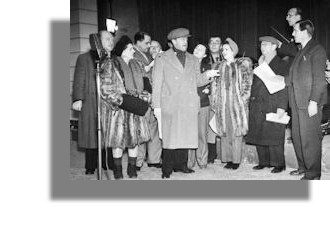
The earliest radio programme I can recall was "ITMA" - the acronym for "It's That Man Again" a quick fire comedy show starring Tommy Handley which ran for 300 episodes from 1939 to 1949. It was full of characters such as Mrs Mopp, Mona Lott (a depressed office cleaner with her catch phrase "It's being so cheerful that keeps me going") and chubby Sophie Tuckshop (the latter played by Hattie Jacques who had a long career in radio, TV and films and who usually finished her conversation with Tommy with "I'm all right now" after a long list of food she had just eaten). The show was full of other catch phrases such as "Can I do you now sir?" and "I don't mind if I do". The graphic on the right shows Tommy Handley and the cast performing an edition of the ITMA show at Scapa Flow on Orkney during WWII.
"ITMA" was aimed at all ages but the "Children's Hour" programme on BBC Radio was definitely geared to my age at that time. It was broadcast from 5pm to 6pm every day - by which time all school children would be home but before the evening news). There was a specifically Scottish edition of Children's Hour which was organised and presented by Kathleen Garsgadden, (known as Auntie Kathleen). It was probably that programme in which I first came across the "Tammy Troot" stories by Lavinia Derwent, about the adventures of a little fish in a burn (stream) and his friends, Rab Rat and Froggy the frog. The graphic on the left shows Tammy admiring his tail -which he was prone to do! The stories were written using Scots words and accents - unlike the rest of the BBC which at that time was very much in a formal "BBC English".
When I got slightly older I began to listen regularly to "Dick Barton, Special Agent" with its exciting introductory music - Devil's Gallop See also the graphic at the top of this page.
The "Dick Barton" radio show on the BBC Light Programme (the BBC at that time had a monopoly of all radio broadcasting) ran from 1946 to 1951 at 6.45 each weekday evening. There were a total of 711 episodes with peak audience of 15 million. The serial followed the adventures of ex-Commando Captain Richard Barton MC and his mates Jock Anderson and Snowy White who solved all sorts of crimes, escaped from dangerous situations (usually at the end of each episode) and saved the nation from disaster time and again.
Dick Barton was followed by the more prosaic "The Archers" - "an everyday story of country folk" set in a fictional English village of Ambridge. It was more in the BBC sedate style than Dick Barton's swashbuckling - though the entire nation was shocked when Grace Fairbrother was killed in a fire in a barn in an episode in 1955 (on the same evening as the launch of the UK's first commercial television station - the BBC denied any connection between the two events). The Archers reached its 60th anniversary on 1 January 2011 and is still running and with more than 17,550 episodes, it is thought to be world's longest-running radio soap opera! Nowadays, many people download the podcasts and listen to them on their smart phones.
Comics
Like so many of my generation I avidly read the "Dandy" and "Beano" comics (published on alternate weeks during to the war due to paper rationing) with the adventures of Desperate Dan, Corky the Cat, Dennis the Menace. As I read these adventures I never envisaged that later in my life I would be able to drive to Dundee where the comics were published and taking digital photographs of a statue of Desperate Dan in a city street - which I would then publish in the pages of Rampant Scotland!
One of the biggest revolutions in UK comics was when the "Eagle" began to be published in 1950, after a major publicity campaign. I was eleven years old at the time and recall having to scour the paper shops on the day of publication to obtain a copy. I was never sure if it was because of the huge demand, an underestimate of sales by the publisher (they sold all 900,000 of the first issue)or a deliberate strategy to make us think that it was a sell-out and to make sure we had a copy on order for the next issue. Dan Dare, pilot of the future was the cartoon strip on the first two pages - the strip was very imaginative as it was about a British aerospace expedition and Dan Dare's battles with the evil Mekon. The Eagle included regular features including a centre-spread of a cutaway drawing showing the workings of things like jet engines, locomotives and cars, so it wasn't just about entertainment and adventures like Riders of the Range and P.C. 49 (a British policeman).
Cinema
Although I have no recollection of the incident, I am told that I was so frightened by the evil stepmother in Snow White that I had to be taken out of the cinema with tears streaming down my face! That experience didn't stop me becoming an avid film fan once I was a little older and going to the cinema every Saturday afternoon became a major part of my life. Westerns with Roy Rogers and Gene Autrey and later John Wayne, of course and adventure films including the inevitable wartime films with stiff upper lip British officers (such as David Niven and John Mills) and Errol Flynn (winning the war on his own), comedies (Red Skelton and Danny Kaye as well as Abbot and Costello), cartoons (Bugs Bunny and Looney Tunes) and, later, science fiction (Forbidden Planet made a big impression on me long before ET came along!) The graphic is a still from Forbidden Planet, considered one of the great science fiction films of the 1950s. It was the very first science fiction film set entirely on another world in interstellar space, far away from the planet Earth and a precursor of what was to come for the science fiction film genre in the decades that followed.
Pantomime
Pantomimes (also known as "Panto") are generally performed during the Christmas and New Year season. Modern pantomime includes songs, slapstick comedy and dancing and follows a classic format of an adaptation of a well-known children's story, music, humour, a principal boy (always played by a girl) and a Panto dame (played by a man). Most children get taken by their parents to the "panto" - perhaps out of their own nostalgia for going when they were young. Although pantomimes are staged across Scotland, my home city of Glasgow has always had a love affair with them - in the 1940s, the Princess Theatre in the city used to run its panto until July instead of just over the Festive season. Part of the fun is the "audience participation". Peter Pan for example always involved the threat of the fairy "Tinker Bell" dying and recovering only in response to the audience (old and young alike) shouting "YES" as loudly as they can in response to the question "Do you believe in fairies?"
Despite competition from TV, film and the Internet, pantomimes are still popular today, seen by large audiences who go along to see the latest rendition of classic children's stories, often with a major element of comedy. Scottish comedians such as Tommy Morgan, Lex McLean, Jack Milroy, Stanley Baxter, Rikki Fulton and Jimmy Logan used to be regular performers until the 1990s and they attracted large audiences. A recent panto based on Babes in the Wood" story became "Weans in the Wood", a hilarious reworking of the traditional tale with a Scottish flavour. The "weans" end up deep in Funnocks Fondant Fancy Factory - any relationship to the local makers of Tunnocks Caramel Wafers is purely coincidental!
Scottie, Glasgow
If you would like to contribute your memories of Scotland when you were young, please send your stories to Scottie@RampantScotland.comReturn to Index of Memory Lane.
